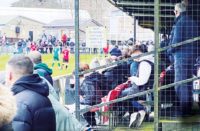Read Part Two here
It's the biggest shake-up in the Non-League game since 2004 and will change the landscape of the National League System.
From next season, a new division will be introduced at Steps 3 and 4 with a total of 20 extra teams being drafted in, while there are also changes afoot further down the Pyramid.
The re-structuring formed part of the conversation at Wembley recently when The NLP sat down with a number of leading figures from the National Game.
Editor Alex Narey and senior writer Matt Badcock joined the head of League and Club Services Laurence Jones, FA?Leagues Committee chairman Ray Lewis, National League System manager Matt Edkins, former Conference champion and Glebe boss Anwar Uddin, now The Football Supporters' Federation Diversity and Campaigns manager, and Tring Athletic's Liam Irons, who also represents the England Cerebral Palsy team, to discuss all things Non-League football.
In this first part of our round table feature, we focus on the upcoming changes and the biggest challenges facing Non-League at this level of the game.
NLP: Everyone's talking about the upcoming restructuring ahead of next season.
RL: This has been on-going for about 18 months. We got agreement in the middle part of last year to go with 1-2-7-14 and as Laurence Jones has quite rightly said, the idea would be to go 1-2-4-8-16, which is something we will work to.
An agreement was reached that Step 3 will be in the central area of the country. People wanted to call it the Midlands, but really it's central when you think it will probably go from Lowestoft to Merthyr Tydfil. We've actually outlined our views as far as that's concerned which will go to the Leagues Committee on the basis that if that's agreed we will then be able to let the leagues and the clubs know more or less where this is going to fit in.
We can't do it on a permanent basis until the end of the season because we don't know who will get promoted or get relegated. So it's very difficult to let clubs know where they are likely to be because it could all alter on the last Saturday of the season.
I've personally, with Laurence and Matt, been around talking to the leagues and the majority have bought into it. I think we've done it transparently, which is the most important thing, we've made sure we've been very open with what we've done. But there are certain things that if they get out the rumours will start flying simply because it isn't what it's going to be at the end of the season.
We've always experienced this with the spine of the country where anyone from Portsmouth up, through parts of Surrey and Buckinghamshire, can either go east or west. It's something we will only experience right at the end of the season when we know who's finished where.
NLP: Obviously to make up the numbers at Step 4 there will be some extra clubs coming up from Step 5.
ME: It will be the champion club from every Step 5 league and then 12 of the 14 second places on a points-per-game basis. If we're in a situation where clubs throughout the Pyramid drift out through financial issues, the other two ‘unlucky runners-up' are most likely to get preferential route in as the back-up two. That's all set in the regulations.
NLP: What if a club says, ‘We don't want to go up?'
ME: Each league was written to at the start of the season and given a document that explained the potential amount of promotions and relegations between Step 4 and 5, 5 and 6, and 6 and 7, depending on a whole host of different scenarios. It could be that a Step 5 league gets one back from Step 4, none back from Step 4 and, in some cases, potentially two back from two different divisions. We circulated that to the leagues and asked them to circulate it to their clubs and we got each of the leagues to copy us into the communications.
So before a ball was kicked, any club that didn't want to be considered for promotion was to make an application to the Leagues Committee highlighting that fact. It wasn't a guarantee we would endorse that application and say, ‘Fine'. But we felt it right to review that position, particularly in a transitional year. We didn't get a club in the country that wrote to us with any concerns. As Laurence and Ray have pointed out, with the system as it is we're looking to move towards a more fluid system. Mandatory promotion and relegation needs to exist for that to work.
RL: We've also looked at Step 6 situation in the north-west of the country. The Step 6 division of the North West Counties League stretched from Cumbria down to Shropshire. Which was far too great an area for a Step 6 league. So we went out and said, ‘What can we do here?' There were seven Step 7 leagues filtering into that one Step 6 league so we asked interested parties if they would like to set one up and the Northern West Counties League said they would split theirs and form two divisions at Step 6. So we're meeting Step 7, Step 8 and below leagues in Lancashire in February, just to talk through the structure and how these leagues are going to fit into this.
We've done exactly the same in Essex – previously there wasn't a Step 6 league in Essex. So we've gone in with the Eastern Counties League and the Essex Senior League and from next season there will be a Step 6 league, so there is a progression going forward.
NLP: So promotion from Step 5 will become compulsory from now?
ME: Certainly this season because it's written in the regulations and, yes, the Leagues Committee have the desire to make it mandatory.
NLP: Even if a club say they just can't do it?
RL: We don't want to have the same problem we had with Cinderford not wanting to be promoted from Step 4 to 3.
NLP: Which affected a lot of other clubs, there was a big knock-on from that.
RL: It gave us heartache to be quite honest, with the problem of an appeal, waiting for it to be heard etc. At the end of the day, to a certain extent, that has spoilt it for the rest of the clubs. Last season we had a problem with ground grading at Step 2.
ME: Darlington, Hungerford, Poole Town, Wealdstone, although Hampton finished higher than them so took the final play-off spot in the National League South.
RL: Those are the types of situations we've learnt by and we've discussed it with the National League. The Leagues Committee look at the national picture. Sometimes some people can be parochial, but what we've got to try and do is say, ‘What is best for the Non-League game?'
LJ: If we don't have automatic promotion between 5 and 4, then we are in danger of creating a National League System that will just stagnate. That's the risk. There has to be an acceptance of the principle that a champion club will get promoted. Otherwise there's a very real risk of stagnation and that can't be in the national interest of the whole National League System.
ME: It's our responsibility to make Step 4 appealable to Step 5 clubs.
RL: One can understand if you're in Penzance and you go into Step 5, you're going to have to go to Bristol. You're probably going to have a 350-400 mile return trip and that is difficult. We've asked the Northern League to look at East-West or North-South as far as travel is concerned and what is happening there. Because what we're hearing is the clubs having to go across the M62 find it difficult. Not only midweek, but also on Saturdays. It's exactly the same where people don't understand the M25 car park and the Dartford crossing.
LJ: It's interesting, I think it's very much a minority of clubs that don't want promotion from Step 5, the message we're getting back from the leagues is they actually want two promotion spots from Step 5 to Step 4.
RL: That can and will happen when we've got 16 leagues there and eight at Step 4. That can happen because it's a natural progression.
LJ: That in turn will make the Step 5 leagues far more competitive.
NLP: There's also going to be lots of reshuffling at Step 6 then with the new leagues coming in.
LJ: It's inevitable at some point that when you shuffle it's going to filter down the system.
ME: In the north-west where there's seven Step 7 feeder leagues there's been quite a number of promotion applications from the north-west based Step 7 clubs this year. We're probably in a better scenario in the north-west than in Essex.
In Essex we've had applications from clubs outside the National League System, which we can do with regulations. In some cases groundsharing, which perhaps isn't ideal.
NLP: Of course ground grading is going to come into that.
ME: We've done a matrix of all of the applicants compared to the ground grading criteria at that level. There are some that meet it already, some not too far off and some that need a little bit of work.
RL: What we don't want to do is lose those clubs out of football. If there is ground grading issues, we will find homes for them so they can still play football. That's got to be emphasised. We're not trying to ruin clubs and kill off a load of football. We're here to help them. Because they haven't got ground grading, or whatever it is, we will find them somewhere to live.
NLP: What are the biggest challenges you see the Non-League game facing in the next five years?
LJ: I think the desire is to get to a pure Pyramid. We want to get to 1-2-4-8, I think that's important.
It's the acceptance for a Pyramid to work, there has to be fluidity. So clubs will get promoted, clubs will get relegated. While you have to be mindful of the geographical constraints around that, there has to be an acceptance that if you put your hand up to play in the National League System, you do so in the full knowledge that you're playing in a system where there's going to be up and downward movement – and there will be sideways movement. The FA try really hard when it comes to constructing leagues that geography is taken into account.
There are times, as in any season, there will be lateral movement. So I suppose meeting everyone's expectation is the challenge, which is a very difficult thing to do.
The way this country is constructed the challenges are very different from a metropolitan area like London, Liverpool or Manchester to greater extremities like the south-west or the north-east.
For the National League System to grow and for clubs to be able to develop, there absolutely has to be this acceptance that there will be movement. I think most clubs get that, I think most leagues understand that. Everyone will have their own view and will, understandably, protect their own corner. We get that.
The role of the FA is to take a measured and reasonable view as to what the best structure should be. That's our aim, to get to a pure Pyramid.
Other challenges are artificial pitches. More and more are becoming available in the Non-League game – we welcome and embrace that. That allows clubs to develop far greater in a community environment.
If you look at clubs like Maidstone and Sutton – and many others – those artificial pitches are important and important to the role the club takes. From an FA's point of view we absolutely embrace that.
We know there are challenges between promotion from the National League and the Football League. Our role is to influence the direction of where that goes. That's a challenge we are going to face. That dialogue is on-going all the time.
Ground grading is also a challenge. I think people can look at it as a negative if they choose, but I think it's a positive challenge. Ground grading has raised the standards of grounds in this country. The overall standards of grounds in Non-League football are significantly higher than when I was refereeing 20 years ago. That's one of the reasons why more people are watching; they are going to an environment where it is more pleasurable to watch a game.
So, if we're talking about challenges – ground grading is one. Leagues set the levels and criteria; the FA's role is to enforce it. That's what we're doing. There's always the risk of winners and losers in that, but you have to have a standard.
RL: That's something to emphas-ise. The leagues actually lay down the standards they require for ground grading. We monitor it. We often get blamed for insisting on certain standards, but it's the leagues who actually say, ‘This is the standard we require'. We have people who go out, ground grading committees, and monitor it.
But, without a shadow of doubt, it has helped with the professionalism, if you like, of the game. Okay, we had some weather recently where games have been called off, but not as much as five or ten years ago where every weekend in January, February and March saw games postponed.
LJ: We have to be honest about it. You can get caught in a cul-de-sac. The standards have been set. The vast majority of clubs and their volunteers have worked tirelessly to ensure their clubs achieve those standards. Some clubs are unfortunate – they might play in dark villages, they might be at a facility where they can't have lights or whatever, but there isn't the wriggle room to accommodate that. Unfortunately the criteria is the criteria. Otherwise you have to revisit the whole criteria and lower the standards. What message does that send to all the clubs across the country who have worked so hard to improve their facilities?
ME: And spent thousands and thousands of pounds doing it.
LJ: It's an emotive and complex debate. I don't think there's a silver bullet for it, to be truthful. I don't think it's as easy as saying, ‘Well, let's just lower the criteria'. I don't think we can do that. The criteria has been set and the vast majority, overwhelmingly, of clubs have achieved it. Most people accept there has to be standards of grading at each Step of the National League System.
NLP: There seems to be a perception that the standard is different across the country, even at the same Step. Is that fair?
LJ: Yes, I think it is fair. We have a responsibility to get a greater level of consistency. I think the biggest challenge is probably at the lower levels of the National League System. We don't sit here blindly ignoring that, we have quite rigorous discussions about trying to find solutions where there can be some flexibility. As you go through the Pyramid, it becomes far more consistent – certainly from Step 5 upwards. There are always variations because some grounds are brand new and modern, some are very historic. But they meet the criteria. There's always going to be a perception around some types of grounds.
Next week…
We continue our round-table debate with more news on ground-grading, 3G pitches, Non-League Finals Day, diversity and disability in football with Anwar Uddin and Liam Irons – plus the panel answer your questions. Let us know your thoughts by emailing nlp@greenways publishing.co.uk
*This article originally featured in The @NonLeaguePaper which is available every Sunday and Monday






















